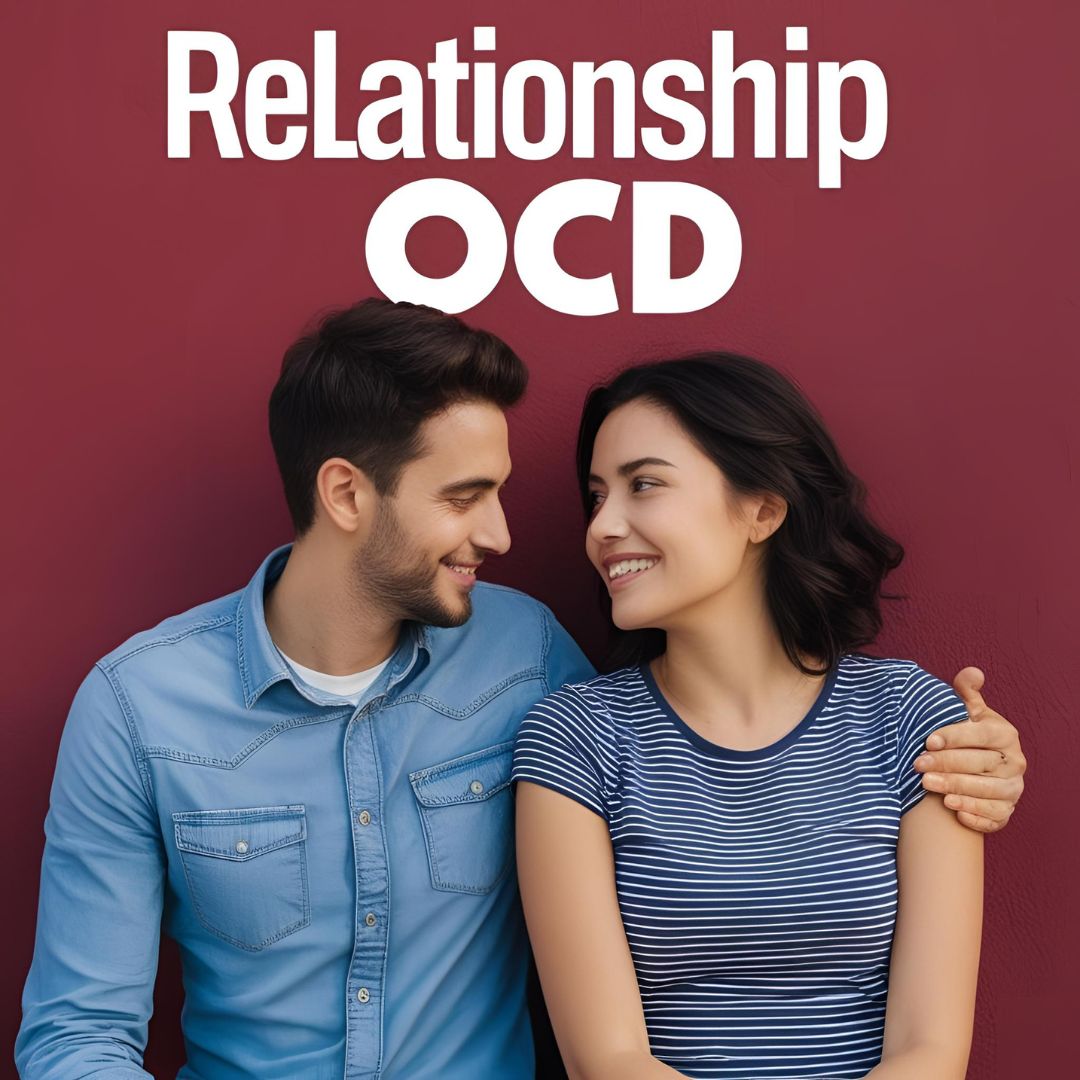LifeHetu
20 Apr 25 08:30 am
Relationship OCD (ROCD) - When Love Becomes an Obsession
Dive in and learn what relationship OCD is. When do you think love becomes an obsession? What are the signs to look out for? How to manage this? Keep reading as you find out how virtual therapy and online counselling services could make a difference.

Introduction
"The greatest thing you’ll ever learn is just to love and be loved in return." But what if your mind keeps whispering, “Are you sure this is love? Are you sure they’re the one?” even when your heart says yes?
Welcome to the world of Relationship Obsessive-Compulsive Disorder (ROCD) - a lesser-known subtype of OCD that often goes undiagnosed and misunderstood, especially in romantic contexts. For those struggling with ROCD, love doesn’t feel like butterflies and connection, it feels like endless doubt, compulsive analysis, and emotional exhaustion.
As online mental health platforms like LifeHetu continue to transform how we approach therapy, it becomes even more vital to spotlight such conditions that silently erode emotional well-being and healthy relationships. This article delves deep into the signs, causes, treatment options, and real-life implications of ROCD, shedding light on how healing is possible with the help of best psychologists in India.
What is Relationship OCD?
Relationship OCD (ROCD) is a subtype of obsessive-compulsive disorder marked by intrusive, unwanted thoughts and compulsive behaviours centred around one's romantic relationship.
Rather than focusing on general obsessions like contamination or order, ROCD fixates on doubts such as:
- “Do I truly love my partner?”
- “Is my partner attractive enough?”
- “Are we really meant to be together?”
- “What if I’m settling?”
These thoughts aren’t fleeting worries, they’re repetitive, intrusive, and often feel uncontrollable. According to a study published in the Journal of Obsessive-Compulsive and Related Disorders, ROCD symptoms are associated with significant distress and impairment, especially in close relationships (Doron et al., 2012).

Real Case: When Doubt Replaces Intimacy
Meet Rhea, a 28-year-old graphic designer from Pune. Her relationship with her partner, Aarav, seemed perfect. They laughed together, shared values, and had chemistry. But slowly, Rhea began questioning every interaction.
“I’d Google ‘how to know if you're in love’ at 2 a.m. I started analysing his every word, his looks, our compatibility. I even asked friends if they thought we looked good together.”
Rhea wasn’t unhappy in her relationship. She was trapped in a loop of obsessive thoughts and compulsive reassurances. After a few months of silent suffering, she finally got help through relationship counselling** and with the help of a therapist, she reclaimed her emotional health.
The Anatomy of ROCD: Obsessions and Compulsions
People with ROCD experience:
Obsessions:
- Persistent doubts about their feelings or their partner's.
- Intrusive thoughts about the relationship’s “rightness.”
- Constant comparison to other couples or hypothetical partners.
Compulsions:
- Seeking reassurance from friends, family, or the partner.
- Repeatedly checking for feelings (“Do I feel in love right now?”).
- Avoiding romantic situations or testing the relationship (“If I feel anxious while holding hands, it must mean something”).
These behaviours are exhausting, both for the individual and their partner. ROCD doesn’t mean you don’t love your partner; it means your brain is hijacked by fear and doubt.
Why Does ROCD Happen?
The causes of ROCD are multi-layered:
- Biological Factors: As with other forms of OCD, ROCD may involve irregularities in brain function, especially in regions related to decision-making and emotional regulation.
- Attachment Styles: Studies show that individuals with anxious or avoidant attachment styles may be more prone to relationship-focused OCD symptoms (Doron & Kyrios, 2005).
- Cognitive Distortions: People with ROCD often have perfectionistic beliefs about love and relationships. The idea that “I must always feel in love” or “There must be no doubts if it’s true love” drives the obsession.
- Societal & Cultural Influences: In cultures where marriage and relationships are idealized or overly emphasized, like in parts of India, such pressure can magnify relationship-related anxiety. Unrealistic portrayals of love in Bollywood, social media “couple goals,” and traditional expectations may exacerbate ROCD symptoms.
ROCD vs. Normal Relationship Doubt
It’s natural to question your relationship at times. But ROCD differs from regular doubts:
| Regular Doubts | ROCD |
|---|---|
| Comes and goes with circumstances | Intrusive and persistent |
| Usually have clear triggers | Often appear without reason |
| Resolved with discussion | Fuel compulsions and never truly satisfy |
How ROCD Affects Romantic Relationships
ROCD can place intense strain on partnerships. Constant reassurance-seeking, emotional withdrawal, or hyper-criticism may lead the partner to feel unloved or misunderstood.
In some cases, ROCD sufferers may end the relationship to reduce anxiety — only to have the same obsessive patterns repeat in future connections. Research suggests that untreated ROCD can lead to lowered relationship satisfaction, emotional burnout, and social isolation (Doron et al., 2016).
Healing ROCD: What Treatment Looks Like
The good news? ROCD is treatable. Therapy, particularly Cognitive Behavioural Therapy (CBT) with Exposure and Response Prevention (ERP), is considered the gold standard. A 2021 study found ERP to be significantly effective in reducing ROCD symptoms over 12 weeks of structured sessions (Abramowitz et al., 2021).
Effective Techniques Include:
- Mindfulness-Based CBT: Helps increase awareness of obsessive thoughts without reacting compulsively.
- ERP Exercises: Gradual exposure to triggering thoughts (e.g., "Maybe this isn't true love") while resisting the urge to seek reassurance.
- Schema Therapy: Addresses deep-seated beliefs about love, self-worth, and perfectionism.
Medication (like SSRIs) may also be prescribed in moderate to severe cases.
The Power of Online Therapy in ROCD Recovery
Given the shame and confusion often associated with ROCD, online therapy offers a discreet and convenient avenue for healing. Platforms like LifeHetu connect individuals with best psychologists, who are trained in OCD subtypes and evidence-based approaches like ERP and CBT.
The flexibility of online counselling services means therapy is accessible even for those with demanding schedules, remote locations, or high levels of anxiety around in-person therapy.
Tips for Partners and Support Systems
If your partner has ROCD, it’s essential to:
- Avoid offering constant reassurance — it reinforces the cycle.
- Educate yourself about ROCD and its patterns.
- Encourage therapy and healthy coping mechanisms.
- Set boundaries for emotionally draining behaviours without dismissing their experience.
Nothing is Perfect
Nothing in this world is perfect. So, healing from ROCD doesn’t mean achieving a “perfect” relationship. It means learning to live with uncertainty, embracing imperfection, and finding peace within emotional complexity.
To quote psychologist Dr. Steven Phillipson, a pioneer in OCD treatment:
"The goal is not to eliminate the thought, but to change the relationship you have with the thought."
Conclusion: Love with Clarity, Not Compulsion
Living with ROCD is like walking a tightrope between deep affection and relentless questioning. But with awareness, evidence-based therapy, and the right support, it is entirely possible to enjoy relationships without fear and obsession.
Whether you’re someone navigating these thoughts yourself or a therapist looking to better understand this condition, let this be your reminder, love isn’t about perfection, it’s about presence.
If you're ready to take that step toward healing, LifeHetu offers access to India’s best psychologists, tailored therapy programs, and compassionate professionals who can help you find clarity amidst emotional chaos.
Sources
- Doron, G., Derby, D., & Szepsenwol, O. (2012). Relationship obsessive-compulsive disorder (ROCD): A conceptual framework. Journal of Obsessive-Compulsive and Related Disorders. Retrieved from https://www.sciencedirect.com/science/article/pii/S221136491200013X
- Doron, G., & Kyrios, M. (2005). Obsessive–compulsive disorder: A review of possible specific internal representations within a broader cognitive theory. Clinical Psychology Review. Retrieved from https://www.sciencedirect.com/science/article/pii/S0005796705000334
- Abramowitz, J. S., et al. (2021). Exposure and response prevention for OCD: Efficacy and predictors of outcome. NCBI. Retrieved from https://www.ncbi.nlm.nih.gov/pmc/articles/PMC8604693/
- What Is Relationship OCD and How Is It Treated? Psychology Today. Retrieved from https://www.psychologytoday.com/intl/articles/202104/what-relationship-ocd-and-how-it-treated
- Doron, G., et al. (2016). Relationship-centered obsessions and guilt in ROCD. Journal of Obsessive-Compulsive and Related Disorders. Retrieved from https://www.sciencedirect.com/science/article/abs/pii/S2211364915300381

